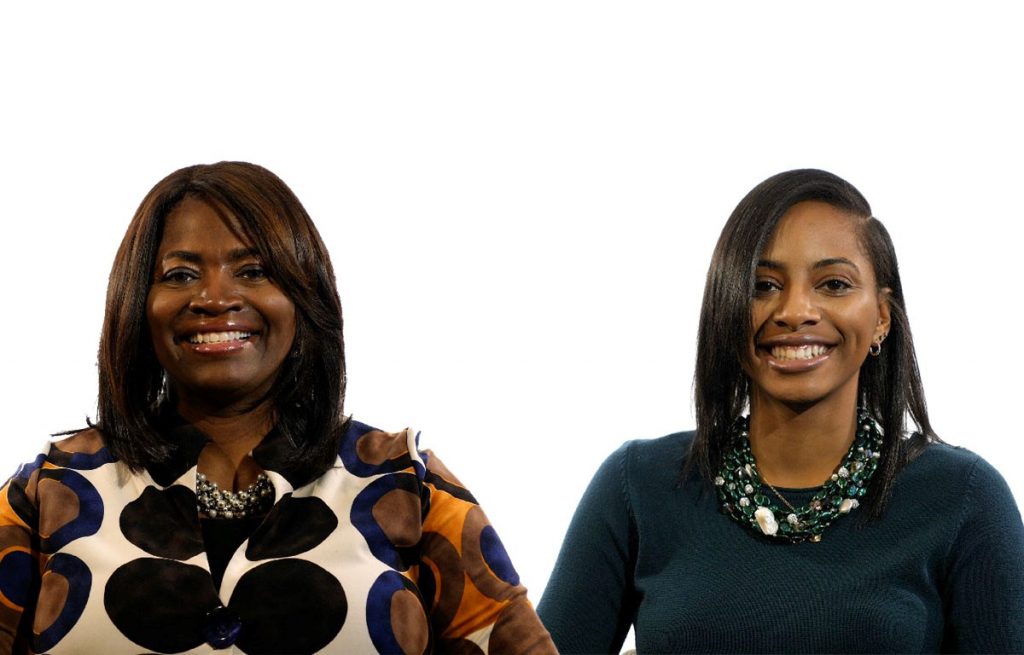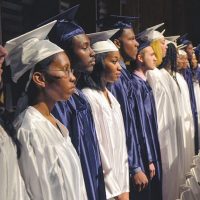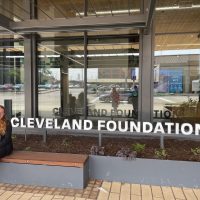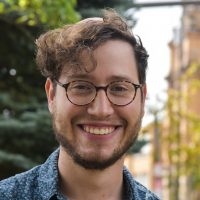When Belva Denmark Tibbs became a mother, she was eager to pass on her long-standing family tradition of serving the community to her daughter, Imani. Guided by the belief that anyone can be a philanthropist, regardless of age or wealth, the women teamed up to create a donor-advised fund with the Cleveland Foundation that will benefit the Greater Cleveland community now and for generations to come. The mother-daughter duo were recognized as featured philanthropists at the 2018 African American Philanthropy Summit. Together, they described how philanthropy became an important part of their relationship. Stay tuned throughout Black Philanthropy Month for additional stories in this six-part series “Celebrating the Faces of African American Philanthropy.”
What are your philanthropic goals?
Belva: My personal mission is to encourage, educate, equip and empower others, and that mission permeates everything that I do. With regards to my philanthropic goals, I’m interested in Christian values (my husband is a pastor), along with education, health, wealth building and youth empowerment. I’m trying to marry my personal mission of encouraging and empowering others with these four or five programmatic areas.
How did you come to be philanthropic?
Imani: My earliest memory of philanthropy is when I was about 3 or 4 years old and we were living in Washington, D.C. It was Thanksgiving, and before we ate our Thanksgiving feast, we went to Freedom Plaza and fed the homeless. In my head, it just made sense; we feed people first, and then we eat. I’ve tried to make that a theme in my life.
How has your mother-daughter bond impacted your philanthropy?
Belva: The mother-daughter bond has impacted my philanthropic work in two major areas. One is the desire to leave a legacy. Every time I look at her, I realize that I’m trying to do something that will not only impact her life but the lives of her children and the community at large. It’s much bigger than what I’m doing right now. The second thing is that she’s the catalyst. I think I may have waited until some point later in my life to do my planned giving, but she would say we need to make a difference now, and we can do that. She’s teaching me different ways of making that change. Her way of looking at philanthropy is different from mine. I was more one-on-one. She’s trying to impact the masses through blogging and social media, things that I have shied away from. Now she’s saying, ‘Mom you’ve got to get that story out, and the urgency is now. People need to understand and hear your wisdom and the value that you bring to the table.’
How has your mother-daughter bond impacted your philanthropy?
Imani: It makes it fun. You’re not standing alone. Obviously, a lot of her passions have become my passions. We share a lot of common interests, so it just adds a new dynamic to philanthropy, and like I said, it’s fun. It’s not, ‘Let’s have a board of directors meeting,’ it’s like, ‘Hey, I saw this the other day, or this is really bothering me, let’s do something about it.’ I think that makes it more enjoyable.
What do you want Cleveland to look like in the future? How can philanthropy be a part of that change?
Belva: A place where inclusion is more than just a buzzword. I grew up in Cleveland. I was part of integrating schools like Hathaway Brown, and I find that some of the discussions I had 40 years ago we’re still having now. I would like to see Cleveland being a place that really embraces inclusion. We’ve got our health systems that are thriving and doing exceptionally well around the world. We’ve got great educational systems here as well, but what’s missing are all the people. We have pockets of excellence, but I don’t think Cleveland can be truly excellent until all people come together. The role of philanthropy is really serving as the convener. It’s very similar to the work that the Cleveland Foundation did with Common Ground, literally getting individuals across Greater Cleveland to sit down and talk about real issues. It starts with connection.
What is the area of greatest need in Cleveland today?
Imani: I can go on so many rants about just access to health care and access to good food. I think coming home to Cleveland, the weirdest thing for me is seeing Whole Foods on one side of town, but if I live on 93rd and St. Clair, I may not have access to the same quality of food. For me, that is where I personally want to impact Cleveland. The city of Cleveland is a food desert, and it doesn’t have to be that way. If we can get access to good food and access to healthy preparation into those communities, I think so many things would be nipped at the bud.
What is the biggest myth about philanthropy? What would you say to individuals who want to be philanthropic but feel that they must be wealthy to give?
Belva: I would tell anyone who’s interested in philanthropy to understand that it’s really just one decision that you have to make, and that’s a decision to give your talent, your time or your treasures. Just start doing that, and you will feel so much better. I think anyone can be a philanthropist regardless of age, wealth or socioeconomic class. It really is the commitment and the decision that you are personally going to make a difference in someone’s life.
What attracted you to the African American Philanthropy Summit?
Belva: I think just being able to tell a story about philanthropy through the lens of the African American community is important, and the African American Philanthropy Summit does that, not only for African Americans, but for the greater community. The other reason that I like the African American Philanthropy Summit is that it allows me to connect with other people who are like-minded. So many times, when I’m serving on boards or doing different things, I may be one of a few individuals of color, and now I have an opportunity to talk to people who have the same interests as me.
Why did you choose the Cleveland Foundation as a charitable partner?
Belva: I’ve always been philanthropic. I started off doing things in our church and doing things with my family as a child. I understand the importance of giving back, so in the back of my mind, I was always thinking I needed to do something a little more substantive, something that was sustainable and something that eventually my daughter would be able to lead. I had looked into starting a donor advised fund, and then, in 2016, my daughter and I attended the African American Philanthropy Summit. She listened to all the topics, then turned to me and she said, ‘Hey, when are we going to start our foundation?’ like, ‘Mom, you need to get on this.’ This child, who of course I’ve been preparing all of her life to continue this legacy of giving back, is now saying, ‘Come on. You need to do something.’ We started our fund, and now my daughter is in the process of helping me think of how we can raise funds.
The African American Philanthropy Committee was created in 1993 to promote awareness and education about the benefits of wealth and community preservation through philanthropy. The committee convenes a Philanthropy Summit once every two years to raise the visibility of African American philanthropy in the region and to honor local African American philanthropists. Save the date for the next Cleveland Foundation African American Philanthropy Summit, “2020 Vision: Disrupting the Cultural Landscape through Philanthropy,” in April 2020, and give online to the African American Philanthropy Committee Legacy Fund.
To learn more about becoming a donor and making your greatest charitable impact, visit www.ClevelandFoundation.org/Give.
The Cleveland Foundation is proud to have provided early funding that made it possible for two upcoming exhibits to travel to Cleveland. Check out:
- The Soul of Philanthropy: Reframed and Exhibited, a multimedia re-imagining of the book Giving Back by author Valaida Fullwood and photographer Charles W. Thomas. The exhibit, which conveys and celebrates traditions of giving time, talent and treasure in the African American community, will be on display from Sept. 6 – Dec. 6, 2019, at the Western Reserve Historical Society.
- seenUNseen, a collection of the works of some of the top African American artists dating back more than a century. On loan from the collection of longtime postal worker Kerry Davis, these objects are on public display for the first time outside of Atlanta. The show, which also includes more than 60 works from local and regional artists, will run from Sept. 20 – Nov. 16, 2019, at the Artists Archives of the Western Reserve and The Sculpture Center.



